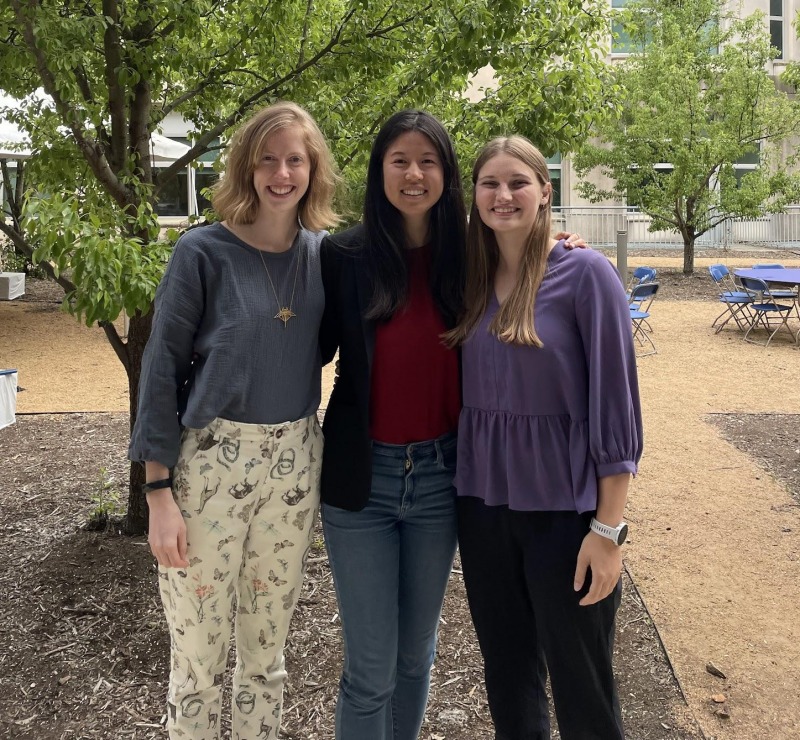Evaluating Education Programs for Marine Conservation
June 27, 2022
After receiving a Bass Connections Student Research Award in Spring 2021, recent graduates Maddie Paris ’22 (Biology and Environmental Sciences) and Claire Huang ’22 (Master of Environmental Management) put their passion for the environment and science education to a new use, creating a systematic literature review on education and outreach for ocean conservation. Building on the work of the Bass Connections Ocean Evidence Gap Map project team, their work will ultimately serve as a resource to strengthen local partnerships and improve conservation efforts in coastal communities. David Gill served as their faculty mentor.

By Maddie Paris and Claire Huang
What makes biodiversity and ecosystem conservation efforts successful?
This is a pressing question for the field of conservation on a global scale, and ocean conservation is no exception. For example, just last year, the United Nations declared 2021 to 2030 as the Decade of Ocean Science for Sustainable Development. This was also the main question we explored this year through our Bass Connections Student Research Award project. We were especially interested in collecting evidence of how education and outreach can contribute to marine conservation goals.
Our project was a natural extension of the Bass Connections Ocean Evidence Gap Map project, in which we examined a broad range of conservation interventions, from marine protected areas to fishery management. Building off our project team’s work, we chose to hone in on education and outreach as one of the areas in which there was a noticeable “gap” in the research literature. As students trained in marine ecology, we were both passionate about exploring the ways in which human beings learn about and relate to their environment.
With the guidance of Becca Horan (Ph.D. candidate in Marine Science and Conservation), our faculty advisor David Gill (Marine Science and Conservation) and our former Bass Connections team lead Morgan Rudd (MEM ’18), we designed a systematic literature review process from scratch, including developing an extensive “search string” to target the types of papers that would meet our review criteria. This was a completely new experience for both of us and we were able to adapt many of the skills we learned as members of our research team, such as how to screen papers efficiently but accurately and how to organize and manage our time for this meticulous research process.
The screening process was daunting, with thousands of potentially relevant papers to process in order to find those that actually evaluated education, outreach or training programs related to marine conservation. But the abstract screening process also raised incredibly interesting questions that led to thought-provoking discussions. Questions like: Does a coral reef virtual reality experience for tourists count as an “educational or conservation intervention” if it might increase their likelihood of donating to a conservation organization? Will a change in knowledge and behavior within a coastal community actually result in better stewardship and desired ecological outcomes?
We also engaged in thoughtful conversations about the process of conducting science and the equity dimensions of marine conservation. For instance, our initial analysis showed that most education or training programs were implemented by NGOs or academic organizations external to the actual community or audience they were targeting. As students whose research has largely focused on the environmental realm (i.e., ecological interactions in salt marshes for Maddie and fish population restoration for Claire), it was useful to step back and evaluate the broader social context for our work.
One of the highlights of our Bass Connections experience was presenting our initial findings at the People & Nature Symposium, hosted by the Duke University Program in Ecology. The themes of the conference were focused on place-based research that incorporates people and communities in science, as well as environmental justice. Maddie hopes to eventually pursue a Ph.D., while Claire will continue working at the intersection of conservation science and policy, so communicating the importance of our evidence synthesis work was crucial to our career goals.
Ultimately, learning about how different education and skill-building interventions can change behaviors towards the environment influenced our own perceptions about conservation as well. Our hope is that NGOs, policymakers and conservation practitioners who are actively designing programs to improve conservation outcomes may use our research to inform how they engage communities that rely on coastal resources.
Learn More
- Read about the 2020-2021 Ocean Evidence Gap Map project team.
- Explore the projects of the other 2021 Student Research Award grantees, including one in which two students examined policy implementation around childhood health and wellbeing in North Carolina.
- Take a look at the winners of the 2022 Bass Connections Student Research Award.
